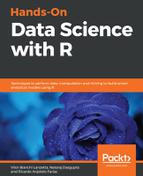First of all, being a data scientist can mean a lot of things. There are several roles that data people can fit themselves into. For instance, you could grow a narrow and specialized set of skills so that you would mostly craft (wonderful) visualizations, as would an artist, or only handle and maintain datasets as a data curator, or mainly design and deploy very complicated models as a core data scientist.
On the other hand, you can grow a very broad skillset and turn into a kind of full-stack data scientist. Each career path will request specific abilities and skills while coming with distinct challenges, rewards, and risks. Yes, risks. For example, a core data scientist in a small company may be replaced by H2O's Driverless AI; as ironic as it sounds—a visualization person in a top-grade magazine will hardly be replaced by software.
If you have read the whole book, you may have already figured out what you like the most, in other words, which role you would be most pleased to fill. Once you have decided, do a little research and discover what it's like to fill that role. Try to talk to people who are currently employed, but if you can't, I am sure Google and YouTube might help you with any questions.
What kind of companies are hiring for role A? What is the daily work like? How much could I expect to make? Ask yourself whether the career feels right for you. If not, research alternative career paths; otherwise, start planning from there. Even if you happen to hold all the skills needed but have zero or very little to show for it, it's time to get some practice and hopefully build a portfolio. The next step is looking out for data.
